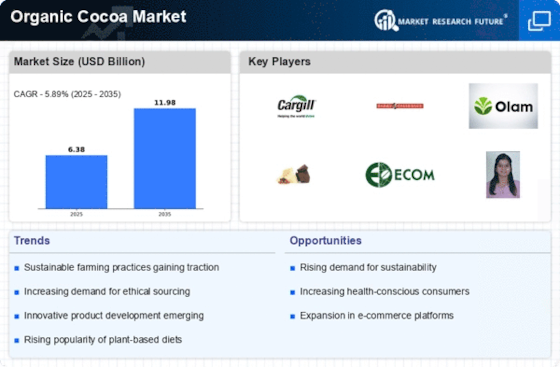Top Industry Leaders in the Organic Cocoa Market
The organic cocoa market has been experiencing significant growth, driven by the rising awareness of health benefits associated with organic products and an increasing preference for ethically sourced ingredients. As we delve into the competitive landscape of this market, it is crucial to analyze various aspects including key players, strategies adopted, market share analysis, emerging companies, industry news, investment trends, the overall competitive scenario, and recent developments in 2023.
List of Key Players
The organic cocoa market comprises a mix of multinational corporations and niche players. Prominent players include
- Kraft Foods Inc. (US),
- Cargill Incorporated (US),
- Tradin Organic Agriculture B.V. (Netherlands),
- Ciranda (US),
- Blommer Chocolate Company (US),
- Artisan Confections Company (US),
- Pascha Company (Canada),
- Internatural Foods Llc (US),
- Wilmor Publishing Corp. (US),
- Barry Callebaut (Switzerland),
- Olam International (Singapore),
- Sunopta (Canada),
- Jindal Cocoa (India),
- Moner Cocoa S.A. (Spain),
- Carlyle Cocoa Co Llc (US).
These companies have a significant presence globally and have established a strong supply chain from cocoa growers to product manufacturers.
Strategies Adopted
Key players in the organic cocoa market are adopting strategies such as mergers and acquisitions, capacity expansion, and product innovation to strengthen their market positions. For instance, Barry Callebaut has been focusing on sustainable sourcing and expanding its product range to include a variety of organic cocoa products. Cargill has invested in traceability technologies to ensure the integrity of its organic supply chain.
Factors for Market Share Analysis
Several factors influence market share in the organic cocoa sector. These include product quality, brand reputation, distribution networks, pricing strategies, and the ability to meet certification standards for organic products. Companies that can effectively manage these aspects tend to secure a larger market share.
New and Emerging Companies
The market is witnessing the entry of new and emerging companies that focus on niche segments or innovative products. For example, startups like Uncommon Cacao are gaining attention by offering transparently traded organic cocoa, which appeals to ethically conscious consumers. These new entrants are intensifying competition and driving innovation in the market.
Industry News and Current Company Updates
In recent industry news, there has been an emphasis on sustainable and ethical sourcing practices. Major players like Olam International have made headlines for their initiatives in improving farmer livelihoods and ensuring environmentally friendly practices. Additionally, companies are increasingly adopting digital solutions to enhance supply chain transparency.
Investment Trends
The organic cocoa market is attracting investments not only in production but also in supply chain and technological advancements. Investors are particularly interested in companies that show commitment to sustainability and ethical practices. There has been a notable increase in impact investing, where funds are directed towards companies that have a positive social and environmental impact.
Overall Competitive Scenario
The overall competitive scenario in the organic cocoa market is characterized by intense competition among established players and the entry of new participants. While larger companies enjoy economies of scale and extensive distribution networks, smaller players compete on aspects like specialty products and sustainability credentials. The market is also witnessing collaborations between companies and non-governmental organizations to bolster ethical and sustainable practices.
Recent Developments
The organic cocoa market saw several significant developments. One of the key trends was the increasing adoption of blockchain technology for enhancing traceability and transparency in the supply chain. This technology enables consumers to track the journey of their cocoa products right from the farm to the shelf, appealing to the growing demand for transparency in food sourcing.
Additionally, there was a notable shift towards direct trade practices, with more chocolate manufacturers directly engaging with cocoa farmers. This approach not only ensures fair prices for farmers but also allows manufacturers to have greater control over the quality and sustainability of the cocoa beans.
Another significant development was the increase in research and development investments, focusing on improving cocoa yield and quality under organic farming practices. Companies are exploring innovative agricultural techniques and investing in research to create more resilient cocoa varieties that can withstand climate change impacts.
Furthermore, the year 2023 witnessed a growing emphasis on value-added organic cocoa products. Companies are expanding their product lines to include organic cocoa derivatives like cocoa butter, powder, and liquor, catering to the diverse needs of the food and beverage industry.
In terms of regulatory developments, there was an increased push for stricter enforcement of organic certification standards to prevent fraudulent practices and ensure consumer trust in organic labels. Regulatory bodies and industry associations have been working closely to tighten certification processes and enhance the credibility of organic claims.











